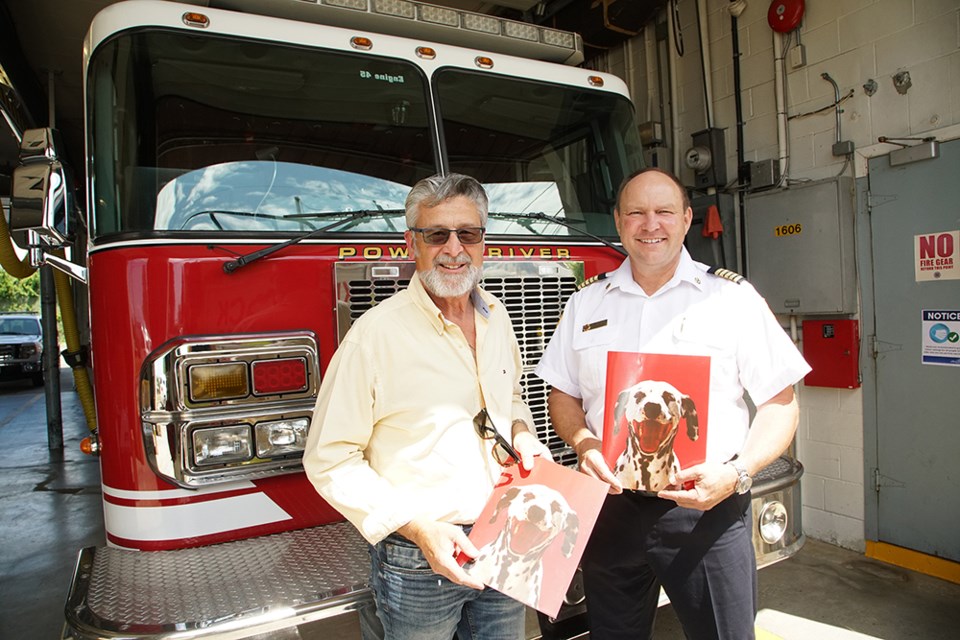City of Powell River will be looking into a program that could provide insurance funds in instances of fires.
At the July 22 finance committee meeting, councillors heard about a company called Fire Marque, which recovers money from insurance companies to cover some of the costs fire departments incur while fighting fires.
Fire chief Terry Peters told the committee that mayor Dave Formosa introduced the Fire Marque program to the fire department after he found out about it at a Federation of Canadian Municipalities convention.
“I thought it was something to review,” said Peters.
Contained in his report to the finance committee, Peters pointed to draft bylaws that would permit the city to enter into an agreement with Fire Marque for recovery of costs after a fire.
Peters said a number of Canadian communities participate in the service; in BC, District of Barriere, near Kamloops, is the first to subscribe. Powell River will be second if council endorsement is received.
“Through the program, it allows us to access premiums that are already established within an insurance policy,” added Peters. “Most insured aren’t aware and don’t act upon it.”
Peters said insurance rates will not go up as a result of this program. He said in insurance policies, there are fire service charges listed.
“This is actually embedded in your policies already,” said Peters. “People need to understand that you are not being charged again for your fire service. You, as a property owner, are being charged a premium by the insurance company and the city is just acting upon that coverage. If we don’t act on it, it goes unpaid and is left with the insurance company.”
Peters said in 2016, Fort McMurray was devastated by wildfires and it was a $4 billion insurance loss. He said $17.2 million of that was firefighting costs and all would have been refundable to that community. Peters said it wasn’t acted upon, so the money stayed with the insurance companies. The same goes with Lytton, he added.
“If we have a large event in our community, it could be very substantial for costs and this is the avenue for us to recover from that,” said Peters.
He said Fire Marque does all of the legwork. The city fire department does not have the resources to access the funds, he added.
“These people [Fire Marque] are experts in this field,” said Peters. “Of the funds that come out, 30 per cent goes to them and 70 per cent would come into the city. Funds generated would come back into the fire department, for training, for public education, equipment – anything that we would actually see fit. In all fairness, this actually lowers taxes. Fire Marque makes sure the insurance companies honour for which they charge their clients.
“This policy for fire services is already buried in your insurance policy. You’re paying for that so you should actually have it utilized to go back into your community. We are actually making sure they pay for the policies you’ve paid for.”
Formosa said some people are concerned this would affect the homeowner’s personal policy in a fire. He said Fire Marque has nothing to do with personal claims and does not touch personal assets.
Policyholder not on the hook
Chris Carrier, Fire Marque national municipal accounts manager, said his company only recovers up to the limits of the policy for the purpose of fire departments. He said an insurance company may have coverage of $5,000 and that’s all that can be recovered.
“The policyholder is not on the hook for the remainder,” said Carrier. “We only recover to the limit of the policy.”
Carrier said he projected a cost recovery for the city, with a range from about $13,500 to $28,000 a year, based upon data provided to him regarding the fire department’s call-out sheets for 2014 and 2015. He said there were some structure and boat fires in those years where insurance money could be claimed.
Councillor Maggie Hathaway asked if the city can take the list of questions asked by the public and send them to Carrier for response. Carrier said that was acceptable.
Councillor CaroleAnn Leishman said if a householder had a claim and the money was recovered to the municipality for fire services, it was not coming out of the policy-owner’s pocket.
“It’s not money they would be getting through a claim,” said Leishman. “As has been said, it would just stay with the insurance company, so recovering that and covering our costs for fire services is benefiting the community. We are not double-dipping or some of the things that have been suggested, correct?”
Carrier said the portion of the policy being discussed is under the additional coverages section. He said the policyholder is entitled to have their property rebuilt, contents replaced and to be put up at a hotel while the work is being done. The money under the additional coverages section is identified as fire department expense charges, said Carrier, and the policyholder is not entitled to those funds, only the municipal fire service is.
“If the fire service does not receive those funds, then the insurance company keeps it,” said Carrier.
Formosa said when he looked at the program, it was a win.
“What a great opportunity for the fire department and for our community,” added Formosa. “For the fire department’s training program, it’s a lot of money.”
Finance committee chair councillor George Doubt suggested taking the matter to committee of the whole in August to provide an opportunity to receive answers to questions that have been posed. The committee gave its consent, and agreed to put information on the city’s website.



